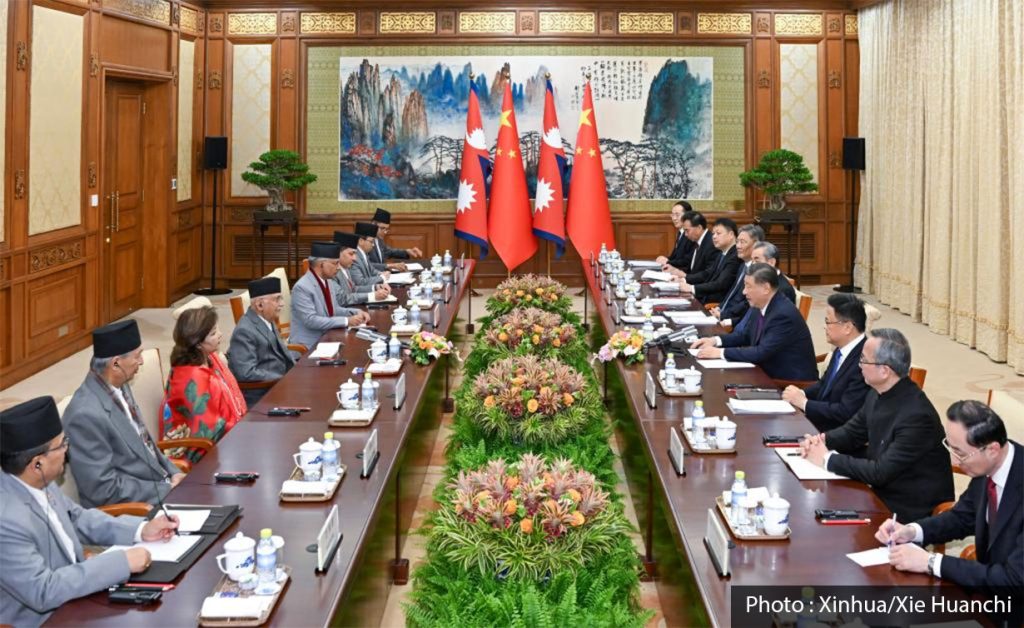KATHMANDU: Prime Minister KP Sharma Oli’s recent visit to China has resulted in significant breakthroughs in bilateral relations, with agreements to advance numerous joint projects aimed at enhancing Nepal’s infrastructure, connectivity, and economic development. During his meetings with Chinese Premier Li Keqiang and President Xi Jinping, both nations committed to strengthening ties and ensuring effective implementation of critical initiatives.
The discussions, described as cordial and friendly, culminated in a joint statement emphasizing mutual efforts to deepen cooperation across a range of sectors. The Chinese side lauded Nepal’s strides in achieving political stability and fostering socio-economic progress, expressing hope for the swift realization of the country’s national aspiration for a *“Prosperous Nepal, Happy Nepali.”*
Key agreements include enhanced collaboration in infrastructure, trade, and energy. Both nations resolved to expedite the execution of signed agreements and decisions related to various joint programs and projects. Recognizing Nepal’s vision of transitioning from a landlocked to a land-linked nation, China committed to supporting advancements in ports, roads, railways, aviation, power grids, and telecommunications.
Among the critical infrastructure developments are the fourth phase of the Araniko Highway maintenance project, the Hilsa-Simikot road project, and the second phase of the Kathmandu Ring Road improvement. Feasibility studies for the Tokha-Chhahare tunnel road and three north-south economic corridors—the Koshi, Gandaki, and Karnali corridors—will also be conducted with Chinese assistance.
The joint statement further highlighted efforts to strengthen border port development. Enhancements will be made to facilitate customs operations, improve bilateral travel, and boost economic activities in border regions. Nepal also requested China’s assistance in opening additional ports and constructing an inland clearance depot and integrated check post at Korala in Mustang.
Energy cooperation remains a cornerstone of Nepal-China relations, with commitments to advancing the feasibility study of the 220 kV cross-border transmission line connecting Gyirong, Kerung, Rasuwagadhi, and Chilime. The statement outlined plans for continued collaboration between the two nations’ telecom operators, including initiatives to repair and expand cross-border landline infrastructure.
Another milestone is the advancement of the Gyirong-Kerung-Kathmandu trans-Himalayan railway project, which both sides agreed to prioritize. A ninth working meeting on railway cooperation is planned, with China offering to train Nepali personnel for railway operations.
In the aviation sector, China and Nepal pledged support for new air routes connecting Chinese cities with Nepali destinations such as Pokhara and Lumbini. These routes are expected to boost Nepal’s tourism industry and strengthen cultural and economic ties between the two nations.
The joint statement also underscored collaborative efforts in agriculture, forestry, and biodiversity conservation. China welcomed the expansion of Nepali exports, including medicinal herbs and tea, and both sides agreed to deepen ties in agriculture, animal husbandry, and fisheries. Nepal and China also plan to convene a fifth meeting of the China-Nepal Forestry Working Group to further environmental conservation efforts.
Education and sports infrastructure were also discussed, with Nepal seeking Chinese assistance to develop the Madan Bhandari University of Science and Technology and construct stadiums in Damak, Jhapa, and Amaragadhi, Dadeldhura.
The statement highlighted the development of the China-Nepal Friendship Industrial Park, for which both nations committed to expediting the signing of the project development agreement. The industrial park is expected to drive economic growth and create employment opportunities in Nepal.
Nepal acknowledged China’s 100% tariff exemption on its exports, a move anticipated to significantly benefit Nepali businesses. Both countries expressed a shared vision of promoting sustainable development and fostering closer economic and cultural ties.
Prime Minister Oli’s visit has opened new avenues for cooperation, laying a strong foundation for future collaborations. As these projects advance, Nepal anticipates transformative impacts on its infrastructure, connectivity, and economic prosperity, marking a pivotal step forward in Nepal-China relations.

